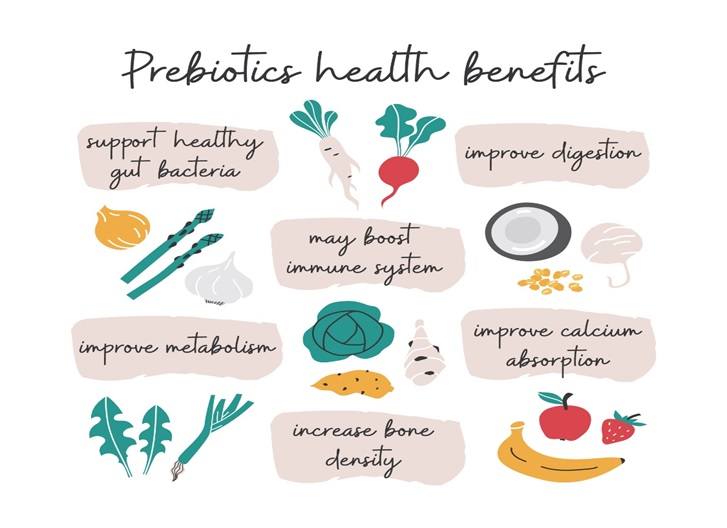Do postbiotics sound familiar? It probably does if it’s prebiotic. Although it may be unfamiliar to some, postbiotics are thought to be just as significant as prebiotics and probiotics, especially when it comes to enhancing our health and preserving our digestive systems. Here’s a summary of everything about postbiotic, including what it is, how it relates to probiotics and prebiotic, how it affects your health, and where it comes from.
Postbiotics
The byproduct of the fermentation activity performed by probiotics in the gut is called postbiotic. Alternatively said, postbiotics are created as a result of probiotics feeding on prebiotic. In general, they are probiotics’ “waste.”
Even though waste products don’t seem like they would be beneficial, it turns out that they play a significant role in many vital, health-improving processes in our gut. Organic acids, bacteriocins, carbon compounds, and enzymes are a few examples.
Interrelationship of Pre-, Pro-, and Post-biotics
Apart from being related, they aren’t the same despite sounding similar. Following are the fundamental variations between each biotic:
Prebiotics – These are substances that function as “food” for the growth of good bacteria, changing the gut microbiota’s composition on a qualitative level. Dietary fibre, such as that found in fruits, vegetables, and whole grains, is the major component of prebiotics.
Probiotics – These are the actual intestinal microorganisms. They contribute to the microbial ecosystem’s health-promoting properties, including enhancing the barrier against infection and acting as an antibacterial, immune-modulator, and anti-inflammatory agent. Foods including yoghurt, kefir, kombucha, and kimchi include probiotics.
Postbiotics – They have metabolites or parts that appear as a consequence of probiotic action in the gut, such as fermentation. Postbiotic is the byproduct of postbiotic fermentation, which occurs when gut microorganisms eat prebiotic fibre.
According to a recent study, most of the good benefits previously attributed to probiotics are caused by a postbiotic. Another way they could support a healthy prebiotic population is by supplying the building blocks for prebiotics to be appropriately processed.
Explained prebiotic come before probiotics and then postbiotic. Prebiotic is then encouraged to be used by postbiotic. Prebiotics act as the “food,” probiotics are the actual bacteria, and postbiotic are the effects of the probiotics ingesting the “food.” Although a postbiotic is a probiotic waste, it may be responsible for many health impacts on people. This gives us a greater understanding of the symbiotic link between people and gut microbes.
Six Health Benefits of Postbiotic
- Strengthens Probiotics
Together, probiotics and postbiotics have positive benefits on human health. Probiotics create postbiotic, which often have immunomodulatory effects that are thought to be good for human health.
- Bacteria Fighting Properties
One of the significant purposes of probiotics and postbiotics is to fill the gut with an environment that encourages the development of beneficial bacteria while inhibiting the population of infectious bacteria. Infection is fought off by the “replacement effect,” which works with postbiotic natural antibacterial abilities.
- Aids in Lowering Blood Sugar and Preventing Obesity
Insulin resistance and obesity have been linked to an unbalanced gut microbiome. Muramyl dipeptide, a postbiotic bacterial component, has been demonstrated to improve insulin sensitivity and alleviate glucose intolerance. This postbiotic is crucial in the battle against pre-diabetes and type II diabetes, while further studies are required to understand the process thoroughly.
- Relieves Diarrhoea
The benefits of probiotic meals and supplements for alleviating diarrhoea have long been proven. A deeper look reveals that the probiotics’ metabolic products, rather than the “good” bacteria’s direct contact with the gut lining, are what causes the impact.
- Decreases Inflammation
Probiotics may not even be helpful for those with IBD; they may worsen the inflammation. In reality, a postbiotic, if administered, may prevent inflammation brought on by certain infections, such as salmonella.
- Supports an Infant’s Immune System and Severe Conditions
Probiotics may not be safe or agreeable for newborns or adults with illnesses that cause immunodeficiency (weakness or a deficit of the immune system). However, postbiotic substances are far more tolerated and may lessen troubling inflammation.
One research looked at the effect of probiotic and postbiotic in treating necrotizing enterocolitis, one of the most prevalent gastrointestinal crises and one of the top causes of neonatal mortality. Postbiotic and prebiotics have been discovered to be viable replacements for or complements of probiotics; however, additional research is required.
Sources
In a lab, a postbiotic may be created and extracted for therapeutic use. They can then be administered topically or as tablets. But here are some foods that might help boost the number of postbiotic in the gut:
- Buttermilk
- Miso Soup
- Pickles
- Soft Cheeses
- Sourdough bread
- Pickles
- Yogurt
Conclusion
We will be hearing more about postbiotics over the following months due to their digestive and health-boosting properties. However, do remember that wellness doesn’t come only from the pills and food we take. We also have to do our part to maintain it by getting 8 hours of sleep, drinking more water, eating more nutritional foods, and exercising.

